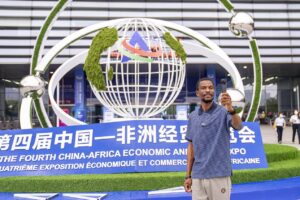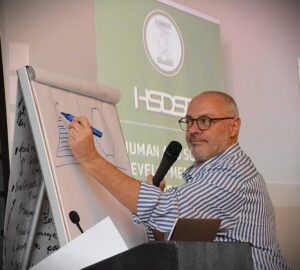By Moses Magadza in Johannesburg, South Africa
The Chairperson of the Committee of Clerks and Secretaries General of the SADC Parliamentary Forum (SADC PF), Mr. Xolile George, has highlighted the role of Clerks and Secretaries of national parliaments in transforming the Forum into a fully-fledged SADC Regional Parliament.
Mr George, who is the Clerk of the Parliament of South Africa, did this on Tuesday when he officially opened a statutory meeting of the Committee under the theme “Ensuring Operational Continuity Post Elections in SADC Member States.”
“We gather here as a special crop of Clerks and Secretaries to our national parliaments with a special call and mandate of driving the establishment of a regional parliament,” he said.
He added, “The SADC Parliament will be a deliberative and a legislative edifice which should always be the hope of the people of the region and effectively transform their lives.”
He said the transformation of the Forum into a regional parliament is no longer speculative but imminent.
“We have now effectively shifted from the domain of envisioning, and we are now in full swing migrating to the domain of the desired state of having a functional regional parliament,” he stated.
He urged Clerks and Secretaries to see themselves not merely as administrators but as “dispensation makers and architects of change” who must provide “administrative wheels for the realisation of the political vision that was set by the leaders of this region.”
The Chairperson envisaged a future SADC Parliament as a continental beacon of excellence and innovation.
He said, “Our immediate agenda is to position the SADC Regional Parliament to be a trailblazer and the knowledge hub not only for the region but the African continent.”

He cited the Forum’s recent focus on Artificial Intelligence during the 57th Plenary Assembly as an example of its commitment to being learning- and innovation-driven.
“Oversight on regional cooperation should be at the core of the agenda of the SADC Parliament. We must foster and monitor the institutional contribution of national parliaments towards the achievement of regional integration,” he told delegates who included SADC Secretary General Ms Boemo Sekgoma.
Mr. George stressed the importance of grounding the regional parliament in the voices of ordinary people and civil society.
“As SADC PF mulls over transitioning to a fully-fledged deliberative and legislative parliament, it must consider how it carries the views of the ordinary citizens as part of its business,” he urged, adding, “This includes bringing the civil society voice into the mainstream agenda of the regional parliament.”
He added that engagement with civil society would “enrich the transition a great deal and surely insulate its legitimacy.”
Mr. George called on the Committee to develop a “strategic thought package” around critical issues including the institutional development model of the envisaged parliament; its policy and legislative agenda; the role of Clerks and Secretaries in building a resilient edifice; the legislative framework conferring powers to the executive; the Parliament’s positioning on the continental and global stages; and its synergy with national parliaments in advancing regional integration.
He also highlighted thematic priorities such as climate change, transnational crime, cyber security, and managing population movements in ways that reinforce rather than undermine integration.
Mr. George reminded delegates of the values that must underpin the new regional parliament.

“We are entrusted with the responsibility of creating a parliament that will carry on and solidify the foundational verities of the SADC PF – being human, gender equality, good governance, democracy and transparency, including the improvement of the quality of life of the citizens of the region,” he said.
The two-day meeting, hosted at the Radisson Blu Hotel in Sandton from 29 to 30 July 2025, brought together senior parliamentary administrators including those from Angola, Botswana, Democratic Republic of Congo (DRC), Malawi, Zambia, Namibia, Seychelles, Zimbabwe, South Africa , Mozambique and Madagascar to deliberate on strategic and administrative matters central to the Forum’s functioning.
Established under the SADC PF Constitution, the Committee serves as a critical advisory organ to the Secretariat and Executive Committee of the Forum.
The meeting provides a platform for Clerks from the 15 SADC Member Parliaments to reflect on institutional performance, identify operational challenges, and peer-learn on innovations that can enhance parliamentary efficiency and regional cooperation.
It seeks to promote administrative alignment and reinforce collaboration between national parliaments and the SADC PF Secretariat. Among key agenda items is a review of the Forum’s Strategic Plan, consideration of internal audit findings, and deliberations on enhancing implementation of Forum resolutions at national level.
A notable focus of the gathering is on the Sweden-funded ongoing Sexual and Reproductive Health and Rights (SRHR) Project (2023–2026), which is entering its third and final year. The Committee is expected to ensure that progress is accelerated across all implementing Parliaments to meet reporting deadlines.
The committee was set to appreciate a presentation on human impact stories and media coverage under the SRHR Project. This session would serve to highlight the real-life change driven by parliamentary action and the strategic use of communication in raising visibility.
More from Africa News 24
SADC PF committee sets the stage for rights-based regional development
The programme included presentations from various Clerks on challenges encountered in implementing Forum resolutions, updates on financial and administrative developments, and discussions on models for inter-parliamentary cooperation.
In addition, sessions were set to explore best practices in the governance of Parliamentary Service Commissions, training and capacity-building opportunities, and the role of Parliaments in oversight.
As a statutory organ situated directly under the Plenary Assembly and Executive Committee on the Forum’s organogram, the Committee of Clerks holds a privileged and influential role in shaping how the Forum operates and supports its Member Parliaments.
Expectations were that by the end of the meeting, the Committee would have provided administrative guidance, endorsed concrete recommendations for strengthening parliamentary systems, and reaffirmed its commitment to building resilient, people-centred legislatures across the SADC region.
-Moses Magadza is the Media and Communications Manager at the SADC Parliamentary Forum.












